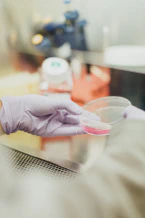Microbiome's Health Impact

How Neurotransmitters Affect Our Emotions and Physical Well-Being
Have you ever wondered why you feel a sudden rush of happiness after eating your favorite food or why you feel anxious before an important exam? Our emotions and physical well-being are influenced by a complex network of chemicals in our brain called neurotransmitters.
These neurotransmitters act as messengers between nerve cells and control our moods, thoughts, and behaviors. They are produced in different situations and play a crucial role in regulating our emotions, sleep, appetite, and even our pain levels.
For instance, serotonin is a neurotransmitter that is responsible for regulating our mood, sleep, and appetite. It is often referred to as the “happy chemical” because it is associated with feelings of happiness and well-being. Low levels of serotonin have been linked to depression, anxiety, and insomnia.
On the other hand, dopamine is a neurotransmitter that is associated with pleasure and reward. It is released when we experience something pleasurable, like eating a delicious meal or receiving a compliment. Low levels of dopamine have been linked to depression, addiction, and other mood disorders.
Understanding the role of neurotransmitters in our emotions and physical well-being can help us better manage our mental health and improve our overall well-being. By making healthy lifestyle choices such as regular exercise, getting enough sleep, and eating a balanced diet, we can boost the production of neurotransmitters and improve our mood and mental health.
Our gut microbiome plays a vital role in our physical and mental health
Apart from our brain, we have another “brain” in our gut - our gut microbiome. The gut microbiome is a vast collection of microorganisms that live in our digestive tract and play a significant role in our health. Our gut contains trillions of bacteria that produce neurotransmitters, vitamins, and other essential chemicals that affect our physical and mental well-being.
Studies have shown that an unhealthy gut microbiome can lead to a wide range of health problems, including obesity, autoimmune disorders, and mental health conditions. Our modern lifestyles, including the overuse of antibiotics and poor diets, have caused a decline in the diversity and health of our gut microbiomes, which may be contributing to the rise in chronic diseases.
Scientists are now exploring the link between our gut microbiome and our overall health. They are finding that by improving the health of our gut microbiome through diet, probiotics, and other interventions, we can improve our physical and mental well-being. It is becoming increasingly clear that our gut microbiome plays a vital role in maintaining our overall health and preventing disease.
Our gut microbiome is as diverse as the Amazon rainforest, and our health is dependent on the life and vibrancy of this ecosystem.
Our gut microbiome is a complex system of microorganisms that reside in our digestive tract. They play an important role in the functioning of our bodies and are responsible for various physiological and metabolic processes. The diversity of this microbiome is comparable to that of the Amazon rainforest, which is home to an incredible array of plant and animal species.
The gut microbiome is vital to our health, as it helps to digest food, absorb nutrients, and maintain a healthy immune system. It also plays a role in regulating our mood and emotions, as well as our cognitive functions such as memory and learning.
However, our modern lifestyles and dietary habits have disrupted the balance of our gut microbiome, leading to a decline in its diversity and functionality. This has been linked to the rise in modern disease epidemics such as obesity, diabetes, and mental health disorders.
Therefore, it is crucial that we take care of our gut microbiome by maintaining a healthy diet, reducing stress, and avoiding the overuse of antibiotics. By doing so, we can support the life and vibrancy of this ecosystem, and in turn, improve our overall health and well-being.
A century of killing bacteria has damaged our gut microbiome
Over the last century, we have developed a fear of bacteria, which has led to the overuse of antibiotics and other antibacterial products. While antibiotics have undoubtedly saved countless lives, they have also had unintended consequences. One of these consequences is the damage they can do to our gut microbiome, which is critical to our health.
Our gut microbiome is made up of trillions of bacteria that perform a variety of essential functions, such as helping us digest food and regulating our immune system. Unfortunately, the widespread use of antibiotics has had a devastating impact on this delicate ecosystem, wiping out beneficial bacteria along with harmful ones. This has left many people with a gut microbiome that is much less diverse and robust than it should be, which has been linked to a host of modern health problems.
In addition to antibiotics, other factors such as our diet, lifestyle, and exposure to toxins can also contribute to the degradation of our gut microbiome. The good news is that we can take steps to restore and maintain a healthy gut microbiome, such as eating a varied and nutrient-rich diet, avoiding unnecessary antibiotics, and reducing our exposure to harmful substances. By taking care of our gut microbiome, we can improve our overall health and well-being.
The Impact of C-sections on Gut Health
C-sections are becoming increasingly common in modern medicine, with approximately one in three children in America being born via C-section. While C-sections can be life-saving for both mother and baby in certain situations, research has shown that they can have negative effects on gut health.
Babies born via C-section miss out on the beneficial bacteria in the birth canal that helps to seed their gut microbiome, which can affect their immune system development and increase their risk for conditions such as obesity, asthma, immune deficiencies, and inflammatory bowel disease later in life.
It’s important to note that not all C-sections result in negative effects on gut health, and there are steps that can be taken to help lessen these risks, such as swabbing the mother’s vaginal microbiome onto the newborn after birth.
Understanding the impact of C-sections on gut health is an important step in promoting overall health and well-being for both mother and baby.
Our Gut Microbiomes are Connected to Our Brains
In addition to controlling physical functions, our gut microbiomes are also connected to our brains. The vagus nerve links our intestines to our brain, which means that signals can be sent back and forth between the two. This connection allows our gut microbiome to communicate with our brain and influence our mood, behavior, and even cognitive function. Scientists are just beginning to understand the complex relationship between the gut and the brain, but research has shown that a healthy gut microbiome is essential for overall physical and mental health.
The Power of Bacteria: How Certain Strains Can Enhance Memory and Reduce Stress
Did you know that certain strains of bacteria in our gut can have a profound impact on our mental health? Studies have shown that certain strains can enhance memory, reduce stress, and regulate stress hormone levels in animals. This is because our gut microbiomes are physically and biochemically connected to our brains through the vagus nerve.
Furthermore, prebiotics found in certain foods can act as fuel for healthy bacteria, stimulating their growth and helping to maintain a healthy balance in our gut microbiomes. By incorporating prebiotic-rich foods into our diets, such as garlic, onions, bananas, and asparagus, we can support the growth of beneficial bacteria and improve our overall health.
It’s important to remember that our gut microbiomes are complex ecosystems, and the balance of bacteria within them can have a significant impact on our physical and mental well-being. By understanding the power of bacteria and taking steps to support the growth of healthy strains, we can work towards improving our health and reducing the risk of disease.
Restoring our relationship with gut microbes for a healthy future
The importance of our gut microbiome for our health cannot be overstated. By restoring our relationship with these microbes, we not only improve our own physical and mental well-being but also contribute to the health of future generations. This can be achieved by adopting a healthy and diverse diet, reducing the use of antibiotics, and increasing physical activity. Additionally, understanding the intricate connection between our gut and brain can help us improve our emotional health and cognitive functions. By taking care of our gut microbiome, we can pave the way for a healthy and vibrant future.
Conclusion
Our gut microbiome is a vital and complex ecosystem that has a significant impact on our overall health and wellbeing. From controlling our emotions and physical well-being through neurotransmitters to influencing our risk of disease, the gut-brain connection is a crucial aspect of our health that we can no longer afford to ignore.
Unfortunately, our modern way of life, including the overuse of antibiotics and C-sections, has drastically altered our gut microbiome, leading to a rise in modern plagues such as obesity, asthma, immune deficiencies, and inflammatory bowel disease. However, by making simple changes to our diets and lifestyles, such as eating prebiotic-rich foods and avoiding unnecessary antibiotics, we can begin to restore our gut microbiome to its natural state.
Furthermore, as our gut microbiome is directly linked to the health of future generations, making these changes now can have a positive impact on the health of our children and grandchildren.
It is important to remember that our gut microbiome is not a static entity but is a dynamic ecosystem that responds to changes in our environment. By taking care of our gut health and restoring our relationship with gut microbes, we can not only prolong our own healthy lives but also contribute to the health of future generations.
In conclusion, our gut microbiome is a vital aspect of our overall health and wellbeing that we cannot afford to ignore. By taking simple steps to restore our gut health, we can reap the benefits of a healthy gut-brain connection and contribute to a healthier future for ourselves and generations to come.
















